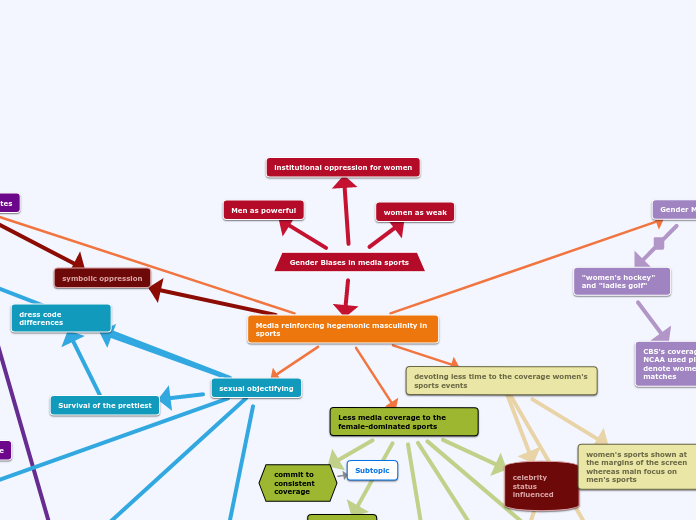Gender Biases in media sports
Media reinforcing hegemonic masculinity in sports
Infantilizing female athletes
Male Commentators target women athletes
putting sexual visuals
making trivial jokes
express less excitement when covering female athletes
cultivation theory
negative portrayal of women in sport
mainstreaming notion
change culture in sports department
hire more female commentators
ESPN magazines
features mostly male athletes
looking heroic, dressed in athletic attire, words used are strong, powerful
to increase sales
featuring female athletes
feminized, not dressed in athletic attire and words use are hot, sexy
shows sports are less important for women athletes.
depreciate sportswomen's accomplishments
roles as mothers or girlfriends before athletes
socially suitable
fundamental roles for women
referred them as "Girls" or "young ladies"
symbolic oppression
Less media coverage to the female-dominated sports
Television Networks
target audience men
showing female models, nudes and weaker than men
SportsCenter only gave 2% of women sports coverage
feature sportswomen who are hotter than better
women as non-athletic and men as athletic
women's sports are relegated to secondary channels
self-feeding cycle
ESPN2
Rhythmic gymnastics, synchronized swimming, figure skating
results in less sponsorships
less money for the sport and athlete
celebrity status influenced
advertisement revenue
commit to consistent coverage
Subtopic
sexual objectifying
media focuses more on their physical attractiveness than their performance
Maria Sharapova, a tennis player
Survival of the prettiest
dress code differences
devoting less time to the coverage women's sports events
women's sports shown at the margins of the screen whereas main focus on men's sports
Gender Marking
"women's hockey" and "ladies golf"
CBS's coverage of NCAA used pink to denote women's matches
women sports are categorized as others
men's sports referred as just "hockey" and "golf"
CBS's used blue color to denote men matches
